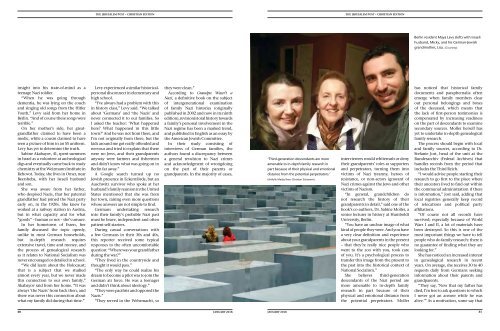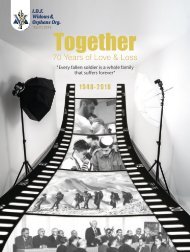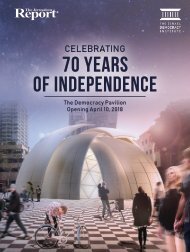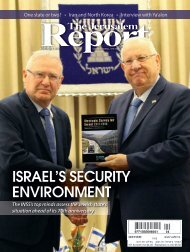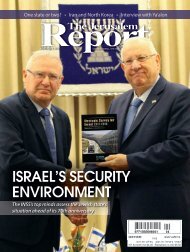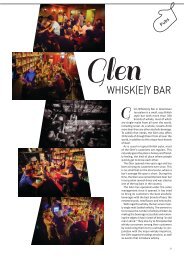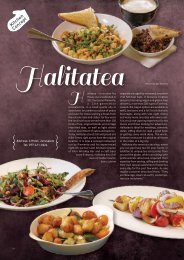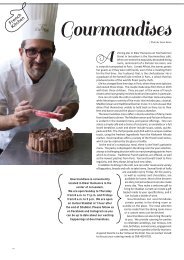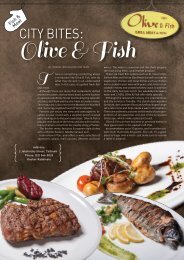CHE-_0_0_0_DoublePages+seg1
Create successful ePaper yourself
Turn your PDF publications into a flip-book with our unique Google optimized e-Paper software.
THE JERUSALEM POST • CHRISTIAN EDITION<br />
THE JERUSALEM POST • CHRISTIAN EDITION<br />
Berlin resident Maya Levy (left) with Israeli<br />
husband, Micky, and his German-Jewish<br />
grandmother, Lisa. (Courtesy)<br />
insight into his state-of-mind as a<br />
teenage Nazi soldier.<br />
“When he was going through<br />
dementia, he was lying on the couch<br />
and singing old songs from the Hitler<br />
Youth,” Levy said from her home in<br />
Berlin. “And of course these songs were<br />
terrible.”<br />
On her mother’s side, her greatgrandfather<br />
claimed to have been a<br />
medic, while a cousin claimed to have<br />
seen a picture of him in an SS uniform.<br />
Levy has yet to determine the truth.<br />
Sabine Akabayov, 41, spent summers<br />
in Israel as a volunteer at archeological<br />
digs and eventually came back to study<br />
chemistry at the Weizmann Institute in<br />
Rehovot. Today, she lives in Omer, near<br />
Beersheba, with her Israeli husband<br />
and son.<br />
She was aware from her father,<br />
who despised Nazis, that her paternal<br />
grandfather had joined the Nazi party<br />
early on, in the 1920s. She knew he<br />
worked at a railway station in Austria,<br />
but in what capacity and for what<br />
“goods” – human or not – she’s unsure.<br />
In her hometown of Essen, her<br />
family discussed the topic openly,<br />
unlike in most German households,<br />
but in-depth research requires<br />
extensive travel, time and money, and<br />
the process of genealogical research<br />
as it relates to National Socialism was<br />
never encouraged or detailed in school.<br />
“We did learn about the Holocaust;<br />
that is a subject that we studied<br />
almost every year, but we never made<br />
this connection to our own family,”<br />
Akabayov said from her home. “It was<br />
always ‘the Nazis’ from back then, and<br />
there was never this connection about<br />
what my family did during that time.”<br />
Levy experienced a similar historicalpersonal<br />
disconnect in elementary and<br />
high school.<br />
“I’ve always had a problem with this<br />
in history class,” Levy said. “We talked<br />
about ‘Germans’ and ‘the Nazis’ and<br />
never connected it to our families. So<br />
I asked the teacher: ‘What happened<br />
here? What happened in this little<br />
town?’ And he was not from there, and<br />
I’m not originally from there, but the<br />
kids around me got really offended and<br />
nervous and tried to explain that there<br />
were no Jews, and their grandparents<br />
anyway were farmers and fishermen<br />
and didn’t know what was going on in<br />
Berlin far away.”<br />
A Google search turned up no<br />
Jewish presence in Eckernförde, but an<br />
Auschwitz survivor who spoke at her<br />
husband’s family reunion in the United<br />
States mentioned that she was from<br />
her town, raising even more questions<br />
whose answers are not simple to find.<br />
Germans undertaking research<br />
into their family’s probable Nazi past<br />
must be brave, independent and often<br />
patient self-starters.<br />
During casual conversations with<br />
a few Germans in their 30s and 40s,<br />
this reporter received some typical<br />
responses to the often uncomfortable<br />
question: “Where was your grandfather<br />
during the war?”<br />
“They lived in the countryside and<br />
thought it would pass.”<br />
“The only way he could realize his<br />
dream to become a pilot was to join the<br />
German air force. He was a teenager<br />
and didn’t think about ideology.”<br />
“They were pacifists and opposed the<br />
Nazis.”<br />
“They served in the Wehrmacht, so<br />
they were clean.”<br />
According to Grandpa Wasn’t a<br />
Nazi, a definitive book on the subject<br />
of intergenerational examination<br />
of family Nazi histories (originally<br />
published in 2002 and now in its ninth<br />
edition), revisionist oral history towards<br />
a family’s personal involvement in the<br />
Nazi regime has been a marked trend,<br />
and published in English as an essay by<br />
the American Jewish Committee.<br />
In their study consisting of<br />
interviews of German families, the<br />
authors found a discrepancy between<br />
a general revulsion to Nazi crimes<br />
and acknowledgment of wrongdoing<br />
on the part of their parents or<br />
grandparents. In the majority of cases,<br />
‘Third-generation descendants are more<br />
amenable to in-depth family research in<br />
part because of their physical and emotional<br />
distance from the potential perpetrators.’<br />
(Artfully Media/Sven Christian Schramm)<br />
interviewees would whitewash or deny<br />
their grandparents’ roles as supporters<br />
and perpetrators, turning them into<br />
victims of Nazi tyranny, heroes of<br />
resistance, or non-actors ignorant of<br />
Nazi crimes against the Jews and other<br />
victims of Nazism.<br />
“In general, grandchildren do<br />
not research the history of their<br />
grandparents in detail,” said one of the<br />
book’s co-authors, Dr. Sabine Moller, a<br />
senior lecturer in history at Humboldt<br />
University, Berlin.<br />
“You have an unclear image of what<br />
kind of people they were. And you have<br />
a very clear definition and experience<br />
about your grandparents in the present<br />
– that they’re really nice people who<br />
went to the zoo with you, took care<br />
of you. It’s a psychological process to<br />
transfer this image from the present to<br />
the past into the historical context of<br />
National Socialism.”<br />
She believes third-generation<br />
descendants of the Nazi period are<br />
more amenable to in-depth family<br />
research in part because of their<br />
physical and emotional distance from<br />
the potential perpetrators. Moller<br />
has noticed that historical family<br />
documents and paraphernalia often<br />
emerge when family members clear<br />
out personal belongings and boxes<br />
of the deceased, which means that<br />
the lack of first-person testimonies is<br />
compensated by increasing readiness<br />
on the part of descendants to examine<br />
secondary sources. Moller herself has<br />
yet to undertake in-depth genealogical<br />
family research.<br />
The process should begin with local<br />
and family sources, according to Dr.<br />
Stefanie Jost, head of the unit at the<br />
Bundesarchiv (Federal Archives) that<br />
handles records from the period that<br />
includes the Third Reich.<br />
“I would advise people starting their<br />
research to go first to the place where<br />
their ancestors lived to find out within<br />
the communal administration if there<br />
is information,” Jost said, adding that<br />
local registries generally keep record<br />
of relocations and political party<br />
affiliations.<br />
“Of course not all records have<br />
survived; especially because of World<br />
Wars I and II, a lot of materials have<br />
been destroyed. So this is one of the<br />
most important things we have to tell<br />
people who do family research: there is<br />
no guarantee of finding what they are<br />
looking for.”<br />
She has noticed an increased interest<br />
in genealogical research in recent<br />
years. On average, she receives 30 to 40<br />
requests daily from Germans seeking<br />
information about their parents and<br />
grandparents.<br />
“They say, ‘Now that my father has<br />
died, I’m free to ask questions to which<br />
I never got an answer while he was<br />
alive.’” As a motivation, some say that<br />
30 JANUARY 2018<br />
JANUARY 2018 31


